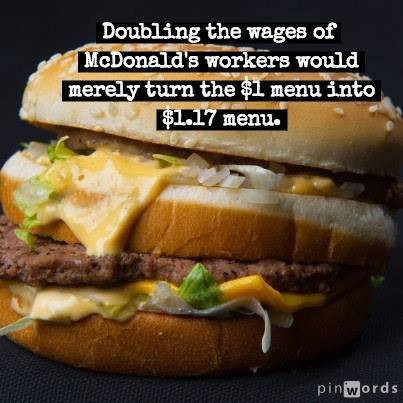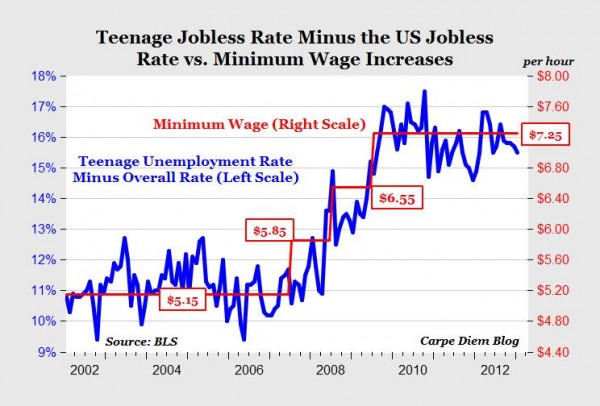That’s what this ridiculous graphic tells us:

Even the Huffington Post
refuted this one. The price increase would be much more substantial. (Though even here, HuffPo’s analysis is suspect. It doesn’t consider the effects of the price increases on the demand for the product: people would buy fewer burgers at the considerably higher prices, which means there would be less demand for fast-food workers’ labor.)
Incidentally, if you want to help poor people, why not just go ahead and do it? Why go the absurdly circuitous route of trying to make food more expensive (which in turn hurts other poor people)? Why not just seek out the working poor directly and help them? And why castigate the only institution in society that has lifted a finger to improve their material condition?
Answer: these people are all talk. They’d love to help everyone in the world, as long as someone else pays the price. These critics pay McDonald’s employees
zero, but they are upset at McDonald’s, which gives them a paycheck. (Once again, I remind readers that the merits of fast food are not the issue here.)
A week or so ago I posted about how utterly wrongheaded the force-wages-up-by-wishful-thinking crowd is, and I explained how in fact wages rise.
Click here for that post.
Let me add a few more thoughts to what I wrote at that link. Once wages are raised to $10 or $15 an hour, why would the critics stop? Isn’t it also tough to live on $10 or $15 an hour? Can’t we wish $50/hr wages into existence? And if we can do that, why not $100/hr?
The kind of thinking reflected in the graphic is that wage rates are really just arbitrary things, and that they can be increased without any real inconvenience to anyone. Plus, they say, it will
help the economy (by stimulating consumption) if people get paid more, etc.
To give a sense of the problem with this latter claim, let’s be sports and set aside the disemployment effects of the wage increase. Let’s consider just the claim that spending more on consumer goods is what an economy needs. (So to be clear, we’re leaving out the point that higher wages don’t necessarily increase the overall spending of workers if fewer workers have jobs in the first place because the higher wages threw them out of work.)
So consider: if it’s “good for the economy” for unskilled labor to be given an arbitrary, coercively levied wage increase, would it also be good for the economy if employers quit shopping around for low prices for steel and just paid more for steel, so the steel manufacturers would have more money to spend on consumption? Would it be even better if they went out of their way to pay more for lumber than the going price? Then the lumber people would have more to spend. Would it be still better if employers paid extra for lumber, steel, labor — and everything else they needed? If it’s “good for the economy” for business firms to pay artificially high wages, why not demand that they pay artificially high prices for everything? Then the economy would be super!
You see the problem. The firm becomes less and less profitable, and less able to support employment, the more it needs to pay for inputs. And the more it pays for some inputs, the less it has on hand to pay for others. Extra money paid in wages over here means less spent on intermediate goods — and thus lower wages for other workers — over there. And the firm is less able to invest in capital equipment, which is what makes all of society wealthier.
A word, too, on the misplaced emphasis on consumption, as if that’s all an economy was about. If all we did was consume, and no one saved and productively expended any resources, the entire structure of production would grind to a halt. Just to maintain the structure of production involves saving enough to support the existing capital structure: all the stages and production processes from raw materials down to the finished product that constitute the intermediate stages of production that are left out of GDP. (For more on this, see
my resource page on GDP.)
So if we were determined to “stimulate consumption,” we should be happy at the following outcome. Suppose we have a lucky person (lucky because the doubling of his wages at McDonald’s did not force him out of a job through layoffs or through the suddenly hastened automation of his job, or did not force him to do extra work, or did not take away his fringe benefits, etc). This lucky person takes some of his extra pay and buys five gallons of milk. The milk seller takes the money he earns from this sale and buys a new shirt. The shirt seller takes the money from selling the shirt and buys a few gallons of gas. And so on. All consumption. Nothing is saved or productively expended.
This means: no wages are paid (since making payroll is not consumption), no business-related bills are paid (again, not consumption), no intermediate goods are ordered by later-stage production (again, not consumption), etc. The result of all this spending: inventories of consumer goods would dwindle, and, the gross saving necessary to keep the production structure up and running not having occurred, the productive capacity of the economy would collapse. There’s your utopia of consumption.
Obviously, then, “the economy” is more than just money passing from hand to hand in exchange for consumer goods. To say that “consumption” needs artificial stimulus is a morally and economically arbitrary value judgment. Only the voluntary decisions of all market actors, based on their own preferences and coupled with a market price system, can give rise to a structure of production that balances our desires to consume with the enormously complex latticework of capital and stages of production that make our preferred level of consumption possible.
One more thing: we are faced with impossible obstacles anytime we think in terms of a “fair wage” that differs from the wage that emerges on the market.
Consider: economist George Stigler noted decades ago that in order to meet the nutritional standards of the U.S. government in 1943 least expensively, a man of 154 pounds could consume, in a year, 370 pounds of wheat flour, 57 cans of evaporated milk, 111 pounds of cabbage, 23 pounds of spinach, and 285 pounds of dried navy beans.
For a wage to be “fair,” would it have to allow only this for food? What kind of variety would be “fair”? Are movie rentals part of “fair” compensation? If so, how many per month? How many cigarettes are “fair”?
This is ridiculous. If you want wages to rise, abandon the juvenile insistence that protests and demands make economic sense.
This is how wages rise.

